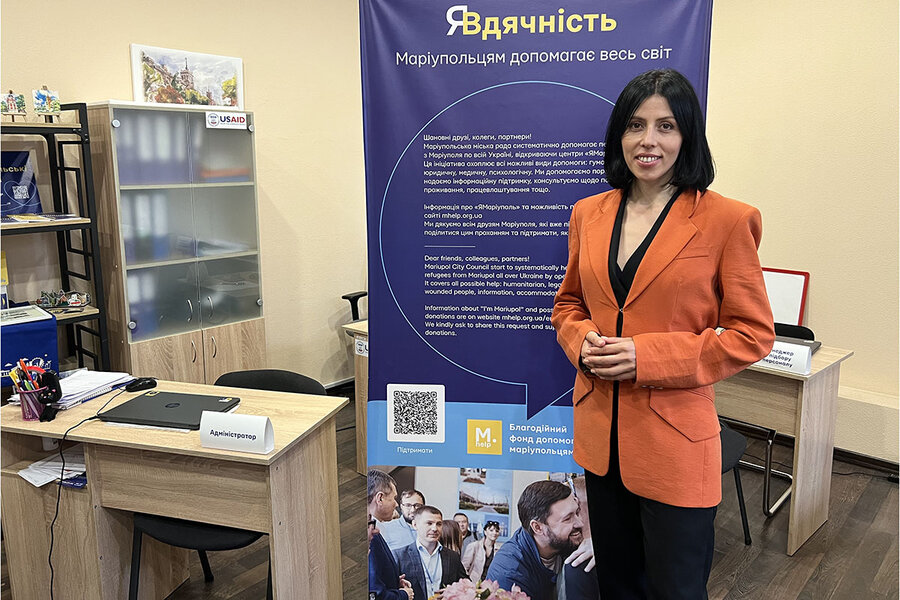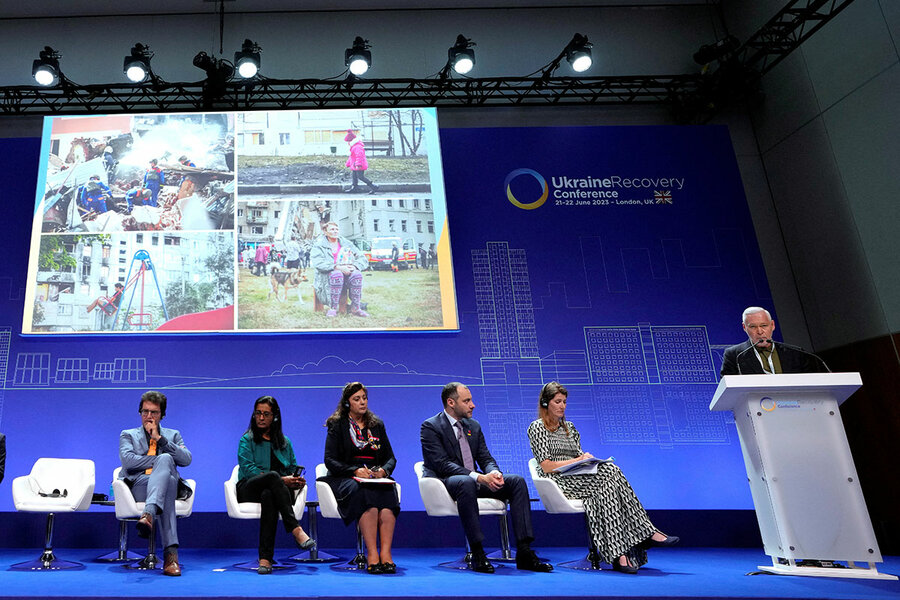
Planning for Ukraine’s reconstruction has already begun at the international level. At the Ukraine Recovery Conference in London in June, hundreds of countries and public and private development organizations pledged $60 billion toward a recovery program estimated to require well over $500 billion.
But in Ukraine, a burgeoning number of professionals – from architects and engineers to sociologists and rights advocates – are focused on more than physical rebuilding. Their goal: a Ukraine reflecting the values and principles of a country that since Russia’s aggression is even more Western-oriented than before.
Why We Wrote This
A story focused on
War’s destructive power affects lives and entire nations. Yet it also paves the way for innovation and rebirth. As Ukrainians plan for the massive reconstruction of their country, they are also discussing the values needed to create a better society.
For a model, many Ukrainians are looking at how Warsaw, essentially razed during World War II, has been rebuilt to become a vibrant and livable city today.
“Since the beginning of Russia’s full invasion, Ukraine’s resistance has been engaged in the choosing of a set of values to guide our struggle for freedom,” says Oleg Drozdov, founder of Rozkvit, a coalition of urban designers and other thinkers whose name means “blossoming” or “renaissance.”
“We are discussing a big shift as we re-imagine Ukraine’s cities,” he says. He foresees a transition “from a development model oriented to what was beautiful but of short-term benefit,” to one that emphasizes durability, careful use of natural resources, “and the needs and priorities of a new Ukrainian society.”
Olha Pikula spends her days imagining and working toward a Mariupol that rises from the ashes of Russia’s invasion and occupation as a renewed, vibrant city.
The Mariupol of Ms. Pikula’s vision is green, inclusive, economically diverse, designed with women in mind, and attractive to Ukrainian youth anxious to play their part in a city’s rebirth.
Before Russia’s full-scale invasion of Ukraine, Mariupol, home to one of Europe’s largest steel mills, was a city of a half-million people that won recognition for good governance.
Why We Wrote This
A story focused on
War’s destructive power affects lives and entire nations. Yet it also paves the way for innovation and rebirth. As Ukrainians plan for the massive reconstruction of their country, they are also discussing the values needed to create a better society.
Today it’s a city of perhaps 100,000 residents, streets of destroyed buildings, mass graves of thousands – and it’s in the hands of occupiers.
But Ms. Pikula – a Mariupol council member who now serves her city’s displaced population from government-in-exile offices in Kyiv – insists that the devastation must also be seen as an “opportunity” to build a new and better city once the war and the occupation are over.
“Of course we will need the places for crying and remembering the dead,” she says, “but we don’t want to remain the city of cemeteries and pain. We want to rebuild our city for living, not for crying.”
To accomplish that, Ms. Pikula says, will require “forward thinking,” and a faith that “we can influence our future” to turn pain into progress.
“When we do that, it opens new opportunities … to build a new Mariupol that will be better,” she adds, “and a new Ukraine that will be much better than it was before.”
A nation’s principles
Ms. Pikula is among a burgeoning number of Ukrainians promoting a national effort to re-imagine Ukraine ahead of what many experts anticipate will be the largest reconstruction project since Europe’s post-World War II Marshall Plan.
Across Ukraine, architects, engineers, city planners, economists, educators, sociologists, and nongovernmental organizations ranging from women’s groups to human rights advocates are uniting to press for a physical rebuilding project that reflects the values and principles of a country that since Russia’s aggression is even more Western-oriented than before.
Planning for Ukraine’s reconstruction has already begun at the international level. In June the Ukraine Recovery Conference in London brought together hundreds of countries and public and private development organizations that pledged $60 billion toward a recovery and rebuilding program that the World Bank and other experts estimate will require well over $500 billion.
European Union officials are investigating the international tools available to force Russia to foot the bill for repairing the extensive damage it has inflicted on Ukraine, from ports and other transportation facilities – more than 300 bridges have been destroyed – to power plants, schools, factories, and residences.
For a model, many Ukrainians are looking to Warsaw and how Poland’s capital, essentially razed during World War II, has been rebuilt to become a vibrant and livable city today. Mariupol even has a branch of its Mariupol Reborn project in Warsaw, to learn firsthand from what is considered a successful rebuilding project.
Yet even as the attention and support of the international community is appreciated and welcomed, some Ukrainians also argue that the rebuilding will be most successful if it is inspired and driven by priorities and values determined by Ukrainians themselves.
“Since the beginning of Russia’s full invasion, Ukraine’s resistance has been engaged in the choosing of a set of values to guide our struggle for freedom,” says Oleg Drozdov, an architect and founder of Rozkvit, a coalition of Ukrainian and foreign urban designers and other thinkers whose name means “blossoming” or “renaissance.”
“In a similar way,” he adds, “the transformation of our future and our future form of society will be the result of a particular number of values that we Ukrainians are choosing.”
A focus on the long term
The act of establishing a set of values to guide this transformation is ongoing, Mr. Drozdov says, but already Rozkvit and other organizations and individuals interested in the mission are coalescing around some core values. Those include transparency, inclusive decision-making, lifelong education, and “circularity” – which Mr. Drozdov defines as economic and societal development based on “ecological responsibility.”
A key feature of this new Ukraine – and a sharp break from models of the past, he says – will be a sense of “responsibility for the future” that elevates priorities like reducing the carbon footprint and reusing (rather than relegating to a landfill) the rubble of Russia’s war.
“We are discussing a big shift as we re-imagine Ukraine’s cities,” he says. He foresees a transition “from a development model oriented to what was beautiful but of short-term benefit,” to one that emphasizes durability, careful use of natural resources, “and the needs and priorities of a new Ukrainian society we can see around us every day.”
A co-founder of the Kharkiv School of Architecture, which was relocated to Lviv in western Ukraine because of the war, Mr. Drozdov says this national effort to re-imagine a postwar Ukraine is finding support not just outside the country – from across Europe and the United States – but from the Ukrainian government as well.
“The government we have now is a new team, completely changed in their discourse from what we heard in the past,” he says. “It’s a new generation of bureaucrats that very much understands the importance of establishing a new set of values … and that our transformation as a country is also about civilizational transformation.”
Still, Ukrainians are quick to acknowledge the importance of international support for and solidarity with their national rebuilding efforts, both physical and spiritual.
This summer, the European Union unveiled a $60 billion Ukraine recovery plan aimed at rebuilding a “prosperous and democratic” Ukraine and leveraging private sector investment in the reconstruction.
The University of Stockholm’s business school is joining Rozkvit in organizing a six-month seminar beginning in the fall on “Rethinking Ukraine’s Cities.”
USAID, the U.S. government’s development agency, established a Forged Together program that works with Ukrainian volunteer groups on projects aimed at healing war wounds and building national resilience.
Lessons from Northern Ireland
In June, the Washington-based Women’s Democracy Network organized a weeklong visit to Belfast for Ukrainian women in municipal government to learn about the role women played in the Northern Ireland capital’s post-conflict rebuilding project.
Ms. Pikula of the Mariupol City Council was part of the Ukrainian group.
“The war they experienced in Northern Ireland and our war are absolutely different, but we learned how the consequences for women of these conflicts are in many ways very similar,” she says. As one example, she notes that as a consequence of both wars, more women have become the sole head of their family and many families’ strongest pillar for dealing with war’s traumas.
Moreover, she says the Belfast visit reinforced her perspective that even a city’s physical reconstruction must be carried out “by women and for women” much more than in the past.
“Establishing trust in our vision for reconstruction will be such an important part of our ability to attract our citizens back to cities like Mariupol,” Ms. Pikula says. “As half of Ukraine’s population, women want to be sure that our cities will be rebuilt with their needs and dreams in mind.”
Still, despite all the lofty talk of international solidarity and a national reconstruction project infused with values, Rozkvit’s Mr. Drozdov says Ukraine’s “renaissance” as a new 21st-century society is not a sure thing.
One reason for his caution: He senses a certain “inertia” setting in as the war drags on, with the conflict’s daily violence and uncertainties taking a toll on hopes for the future. Another worry he cites is an accelerating “brain drain,” especially among the talented young people who would be counted on to take part in re-imagining their country’s future.
Too many bright, knowledgeable Ukrainians are leaving behind the insecurity of war to pursue professional goals elsewhere, he says.
But what keeps him optimistic about prospects for the new Ukraine he envisions is the rapid progress he says the country has made over the last decade – and what that tells him about a society that is ready to become something new.
“As we could see before this war, Ukrainians are able to learn very fast, evolve with high speed, and absorb new knowledge and embrace new thinking,” he says. “Now in the war, our army shows us these same qualities every day.”
It’s the vitality and resilience of those qualities that leave the Kharkiv architect confident in the “blossoming” of a new and better Ukraine from the destruction and trauma of war.
Oleksandr Naselenko supported reporting for this story.

